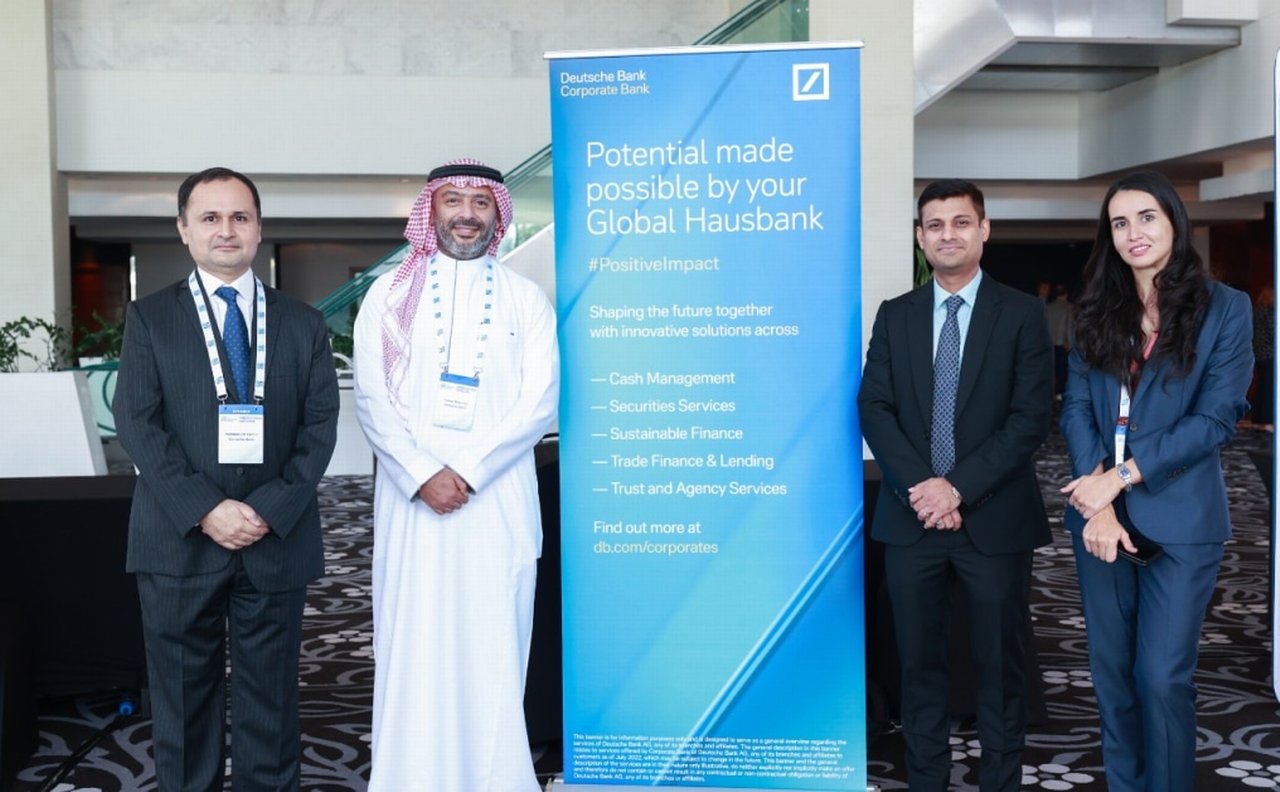24 November 2022
After a three-year hiatus The Network Forum’s Middle East Meeting returned in October 2022 as an in-person event. flow reports on its key themes of post-trade digitalisation, Saudi Arabia’s ongoing market reforms, settlement compression and improvement of account opening processes
MINUTES min read
While global markets stagnate as inflationary pressures and rising interest rates stifle growth, the Gulf Co-operation Council (GCC) economies are thriving off the back of soaring commodity prices. This, in turn, is generating growing investor interest in the region.
The Network Forum’s (TNF) Middle East Meeting took place in Abu Dhabi in October, having last been held in person in Muscat, Oman back in 2019 before the Covid-19 pandemic. More than 120 network managers, direct custody providers, financial market infrastructure (FMI) representatives, and technology innovators from across the region and beyond made their way to Abu Dhabi for the two-day conference. This article summarises the main discussion points.
Market reforms in Saudi Arabia
To attract more foreign investment, GCC countries are implementing extensive market reforms. In just seven years, Saudi Arabia has transformed itself from a market where foreign investors could only access local securities through complex swap arrangements to an economy that is largely open to outside institutional investment, albeit subject to certain restrictions.1
Since Saudi Arabia allowed qualified foreign portfolio investors into the country in 2015, it has introduced T+2 trade settlement; established an independent custody model; and created robust FMIs, including Muqassa, a domestic central counterparty clearing house (CCP) and Edaa, a central securities depository (CSD).
The topic was addressed by a panel featuring Patrick Kong, Senior Vice President at Dubai Central Clearing & Depository Holdings LLC, Konstantin Saroyan, Secretary General at the Federation of Euro Asian Stock Exchanges (FEAS), and Duaij Asaleh, Deputy CEO at Kuwait Clearing Company, which discussed CSD activity in the GCC. Bandar Alkahail, Custody & Fund Services Senior Head, Business Development at Edaa, said that the Saudi Tadawul Group had implemented a series of post-trade infrastructure enhancements.
For example, Edaa has launched a new CSD system and post-trade services, in alignment with international standards. These include the adoption of straight-through processing (STP) of ISO messages, as well as improved daily and ad-hoc reporting. In addition, Saudi Arabia has introduced same day settlements for buy in trades and a highly flexible settlement cycle for negotiated deals enabling buyers and sellers to agree on a settlement cycle ranging from T+0 to T+5. This initiative which will help encourage further inward investment, added Alkahail.
Mutual market access gathers momentum
“The GCC is seeing increased cross-collaboration between FMIs”
Other markets across the region are also embracing change.
Hammad Izz-Hamid, Head of Securities Services, Middle East & Africa, at Deutsche Bank, told flow that the GCC is seeing increased cross-collaboration between FMIs. This, he said, was evidenced by Abu Dhabi Securities Exchange (ADX) and Bahrain Bourse’s (BHB) recently announced formation of Tabadul, a mutual market access hub facilitating easier cross-border trading and post-trade links between the two countries.
Through Tabadul, investors in Abu Dhabi and Bahrain will be able to trade on the other’s respective stock exchange through licensed brokers in each market.2
“Tabadul will help drive up liquidity in both Abu Dhabi and Bahrain. It is possible that similar links could be introduced across the region. The cross listing of securities between Kuwait and Bahrain, which is supported by the market FMIs, is another development which will help increase investor market access,” added Hammad Izz-Hamid.
Will T+1 come to the GCC?
There is intense speculation as to whether the GCC markets will follow the US, Canada and India by shortening their trade settlement cycles to T+1. Hammad Izz-Hamid acknowledged several markets are moving in the direction of T+1, adding that the GCC is quite likely to follow in due course.
“Markets in the GCC region have made huge progress in transitioning from T+5 or T+0 to T+3 and T+2. In time, I think they will move to T+1, as this will help financial firms reduce operational and counterparty risk, thereby freeing up capital and improving liquidity,” he explained in the panel session ‘Capital market drivers for change 2022 and beyond: the next stage in custody evolution’.
“However, T+1 does have constraints. For instance, investors and intermediaries operating in different time zones could have issues around trade funding and FX management, trade matching and confirmations. These challenges, as real as they might seem, are not necessarily insurmountable and are addressable with improvements in technology and processes.”
Some have warned that transitioning to T+1 in emerging markets, such as the GCC, could create risks if not done correctly. One expert on the same panel highlighted that ongoing market issues, such as the continued existence of dual account structures, must be resolved before T+1 can be seriously considered in the GCC.
“When discussing changes of this magnitude, it is vital that global custodians, brokers and their clients are all involved in the conversations with the authorities,” he emphasised.
New investment products make a splash in the GCC
GCC markets continue to launch new investment products much to the approval of foreign investors. Saudi Arabia has created a derivatives industry allowing investors to hedge their market exposures in the country. It has also unveiled a wide range of investment tools, including securities lending, securities borrowing and short-selling. Kuwait and Abu Dhabi have also both established derivatives markets together with CCPs.
On environmental, social and governance (ESG) issues in the GCC, clear progress is being made but it is slow. Speaking on a panel titled “ESG – the global and regional impacts on us all: Issuance, ratings and how to service” featured Racha Alkhawaja, CEO at TPL Investment Management; William Tohme, Senior Regional Head for MENA at the CFA Institute and Tanja Ferri, Head of Operations, Risk and Product Management at Azimut, a leading investment firm, who described ESG in the Middle East as largely in its infancy.
Ferri went on to identify the absence of shared ESG definitions, inconsistent regulation globally and a lack of (or ambiguity in) reported data as among the challenges facing the sustainable finance industry today.
Local market problems
Although GCC economies have made excellent progress improving their capital markets, there is still room for further development.
Account opening processes in the GCC are in need of improvement. During the panel session “The Network Manager in Focus – views on the region, what’s good for us…and what could be better”, a speaker said that while transferable National Investor Numbers (NINs) had been made available to domestic investors within the GCC, enabling them to seamlessly open up accounts across the region, foreign investors had been excluded.
As a result, foreign investors must obtain a new NIN whenever they open an account in any of the individual GCC markets. “The development of a common GCC-wide NIN would certainly make it easier for foreign investors to open up accounts across the GCC,” said Manoj Aidasani, Head of Securities Services, GCC, at Deutsche Bank, speaking to flow.
Adding further complexity, Know-your-Client (KYC) checks are not harmonised within the GCC either continued Aidasani, creating challenges when opening up accounts. “If KYC checks are to be expedited, then a GCC-wide KYC registry really ought to be established,” he suggested.
“Many regulators in the GCC are open to new ideas and suggestions on how to improve their local markets”
The speaker further emphasised that certain GCC markets continue to rely on the outmoded dual account structure model. Dual account structures are unpopular for several reasons, but primarily because they are risky as custodians can transfer securities to trading account prior to any receipt of cash. “Regulators in the GCC are aware of these challenges, and many of them are open to new ideas and suggestions on how to improve their local markets,” said Aidasani.
A region at the forefront of digitalisation
Currently, institutional investors and traditional custodian banks appear to be wary of the more volatile digital asset classes (such as crypto currencies), which are unregulated and not underpinned by typical macro fundamentals.
“In terms of the traditional institutions trading crypto-currencies right now, they are generally on the smaller side,” said Luke Dorney, Head of Sales EMEA at Blockdaemon, an institutional grade blockchain infrastructure company and a panellist on the session titled ‘Post-trade digitisation, crypto and digital assets - market innovation and the rise of non-traditional banks’.
It is therefore unlikely that these crypto providers will disintermediate the traditional banking incumbents. Instead, Dorney anticipates that a parallel crypto-currency investment universe will emerge populated by small institutional investors (i.e. crypto-funds, hedge funds, family offices etc.), crypto-exchanges and crypto-custodians.
So, what types of digital assets are traditional custodians most excited about?
According to Aidasani, “Tokenisation of assets is one such topic which has seen interest across the investor segments.3 Tokenisation can be used across multiple asset classes such as equity, debt, real estate and other physical securities,” he said when speaking in the session titled ‘Post-trade digitisation, crypto and digital assets – market innovation and the rise of non-traditional banks’. “However, every use case to tokenise an asset should be reviewed for the benefits it brings to the process versus the effort required to implement it. Tokenisation should not be used as a blanket to cover all asset classes across various markets.”
Use cases are already being developed around digital assets. Aidasani said that non-fungible tokens (NFTs) and smart contracts could play a meaningful role in helping to settle money market instruments in Saudi Arabia (a point he had elaborated on in the flow article, Dawn of a Saudi Securities Services solution). In Saudi Arabia, money market instruments are traded OTC and the settlement process is inefficient. This is because the current settlement model restricts the role of custodians to that of record-keeping, cash transfers and reporting, thereby contributing to payment delays.
“We can use NFTs and smart contracts on a private blockchain model as this will make it possible for custodians to record and reconcile post-trade. As the workflows are automated, this addresses the inefficiency issue,” said Aidasani.
Service providers are hoping to support clients who might one day be interested in trading digital assets. “As a custodian bank, we are looking to create products and services that are required by our clients. As institutional investors evolve and incorporate digital assets into their investment portfolios, there will be a need for financial institutions to offer digital asset custody as part of their service offering. Asset managers will expect their custodians to be able to support these new asset classes,” added Aidasani.
Regulation, however, will be critical to the success of digital assets, and some forward-thinking GCC countries are trying to bring an element of order to this nascent market. One speaker, a panellist on the session exploring CSD activity in the region, told TNF that much of the regulatory focus in Dubai right now is on creating a sound supervisory framework for digital assets. Dubai’s Regulation of Virtual Assets Law, for example, lays down the rules around digital asset trading and creates a regulatory body to enforce them. This comes as Dubai increasingly tries to position itself as a hub for digital asset trading.4
A bright spot in a weak global market
Amid the desultory GDP growth figures in other parts of the world and especially in emerging markets, the GCC stands out. Strong macro forecasts have put the region on investors’ radars at a time when returns are difficult to come by. Simultaneously, many GCC economies are transforming their capital markets for the better, by making it easier for investors to gain access to them. This puts the GCC in an excellent position moving forward.
The Network Forum Middle East Meeting was held 17–18 October 2022 in Abu Dhabi, UAE

The Deutsche Bank Middle East Securities Services Team. Left to right: Hammad Izz Hamid, Fawaz Mohanna; Manoj Aidasani; and Nadia Si Mohammed
Sources
1 See „Saudi Arabia’s new capital markets infrastructure“ at flow.db.com
2 See citywire.com
3 See „Token power“ at flow.db.com
4 See dubaibusinessservices.com
Securities services solutions Explore more
Find out more about our Securities services solutions
Stay up-to-date with
Sign-up flow newsbites
Choose your preferred banking topics and we will send you updated emails based on your selection
Sign-up Sign-upSubscribe Subscribe to our magazine
flow magazine is published annually and can be read online and delivered to your door in print
You might be interested in
SECURITIES SERVICES {icon-book}
Saudi Arabia’s new capital markets infrastructure Saudi Arabia’s new capital markets infrastructure
Saudi Arabia has demonstrated enormous resolve by opening up to foreign investors. Having once been inaccessible, the country has created an excellent framework to facilitate inward investment, reports Deutsche Bank’s Manoj Aidasani
SECURITIES SERVICES, TECHNOLOGY
Dawn of a Saudi securities services solution? Dawn of a Saudi securities services solution?
What will post-trade settlement in Gulf Cooperation Council countries look like in the future? And how can the OTC settlement process be improved? Deutsche Bank’s Manoj Aidasani proposes a blockchain-based solution, using non-fungible tokens (NFTs) and smart contracts to settle money market instruments
SECURITIES SERVICES
Back in the Big Apple – TNF Americas Back in the Big Apple – TNF Americas
The Network Forum (TNF) returned to New York for its Americas Meeting on 22 September, where leading experts from across the securities services industry discussed settlement compression, macro-economic challenges and digital asset readiness. flow reports



